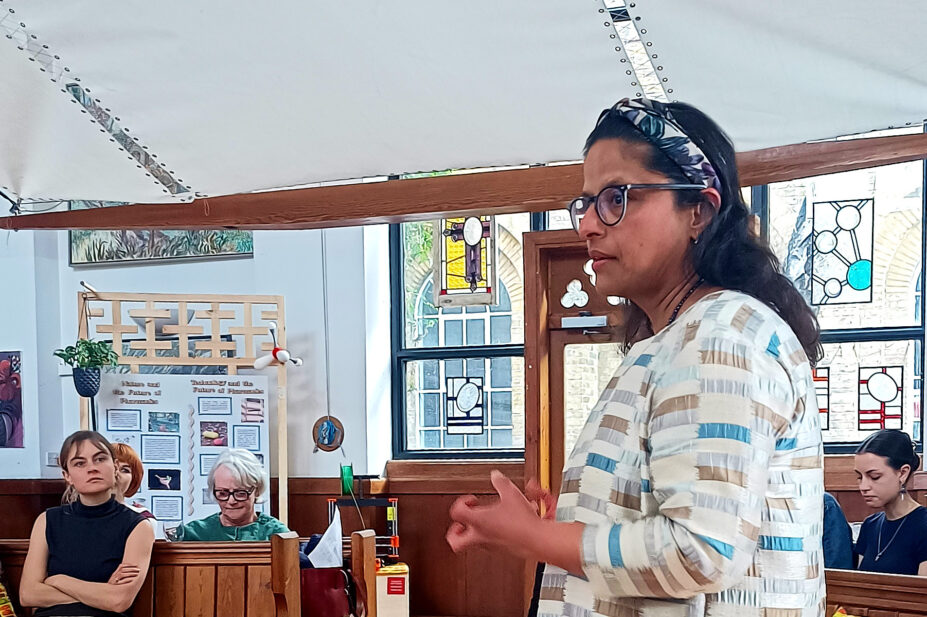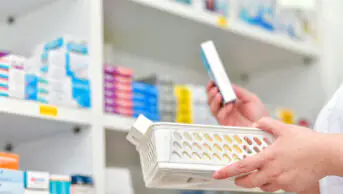
The Pharmaceutical Journal
Organisers of a new exhibition on the architecture of pharmacies are inviting people to share ideas on how to make the best of community pharmacy spaces.
‘Architecture of Pharmacies: Counter Culture’ is an interactive pop-up exhibition hosted at the Bromley-by-Bow Centre in east London. It has been developed to get people thinking about how pharmacy spaces can be optimised to be more inclusive, to promote health and to support pharmacy teams to achieve best practice.
The community exhibition — which brings together individuals from the arts, architecture, pharmacy, health, policy and research, including the Royal Pharmaceutical Society (RPS) — forms part of the 2024 London Festival of Architecture and is the first time that a community pharmacy space has been featured.
The exhibition is part of a wider ‘Architecture of Pharmacies‘ research project created and led by Ranjita Dhital, a pharmacist, artist and lecturer in interdisciplinary health studies at University College London (UCL), and exhibition co-lead Joseph Cook, an anthropologist at UCL with a focus on architectural design.
At the exhibition’s launch on 29 May 2024, Dhital told The Pharmaceutical Journal: “There haven’t been many meaningful discussions about the sensory experience of space.
“We published a systematic review of the evidence where space was mentioned [in community pharmacy], so from that we can give some theoretical recommendations. But really, this field needs to grow. So, this study is really exploring what space means to people, how we build this discourse,” she said.
Dhital added that the field of health architecture is a growing trend in hospitals. “It’s also about how things are designed around your equipment: where you sit, where you work; who you work and collaborate with,” she said.
“It’s not just about objects: it’s about things that are invisible, like space: how you feel in your space. If it’s been designed well, you can feel calmer and you’re able to think clearly, and really get engaged with somebody.”
Parts of the exhibition were co-created with purpleSTARS, which brings together people with and without learning disabilities who have expertise in transforming museum experiences to make them more inclusive.
At the launch, Kate Allen, co-founder of purpleSTARS and a professor at the at Rix Inclusive Research at the University of East London, where purpleSTARS is based, told The Pharmaceutical Journal that when she met Dhital they started exploring ways to embed arts into pharmacy.
“We started doing work with the pharmacy students and art students, combining things. When [Dhital] was thinking about how we could start a conversation about pharmacies and people’s experiences of them, it was an obvious thing to come up with alternative ways and views; of engagement with the subject matter,” she said.
“If we really want to be inclusive, and we really want to hear other people’s voices, we have to think of different ways to support people to do that.”
The launch evening included a range of speakers including Amandeep Doll, head of professional belonging at the RPS, who spoke about the importance of designing inclusivity into pharmacy spaces for both staff and patients.
Doll hosted an online meeting with the exhibition team in April 2024 to talk about the ‘Architecture in Pharmacies’ project and to think about how small changes can make pharmacy workspaces more accessible.
The free exhibition will be at the Bromley-by-Bow Centre until 7 June 2024 and will include a series of events. More information is available here.
A blog by three members of the Purple Stars research team, outlining their work to design more inclusive pharmacies, is available on the RPS website.
- This article was amended on 11 June 2024 to correct Kate Allen’s job title and to clarify the style of the name ‘purpleSTARS’


